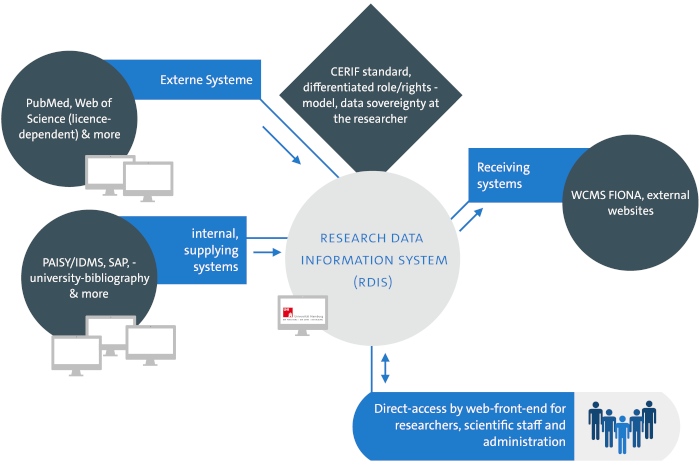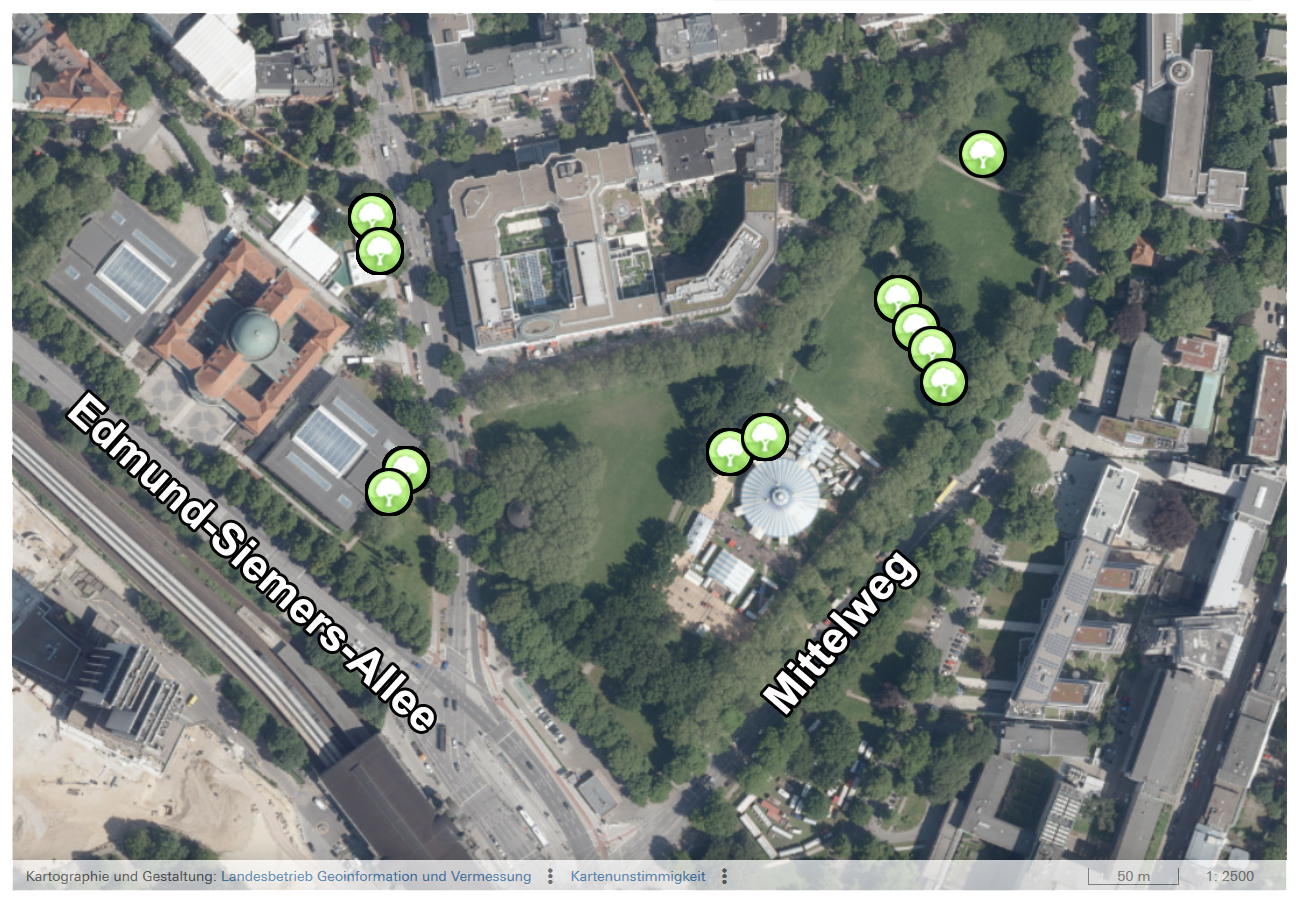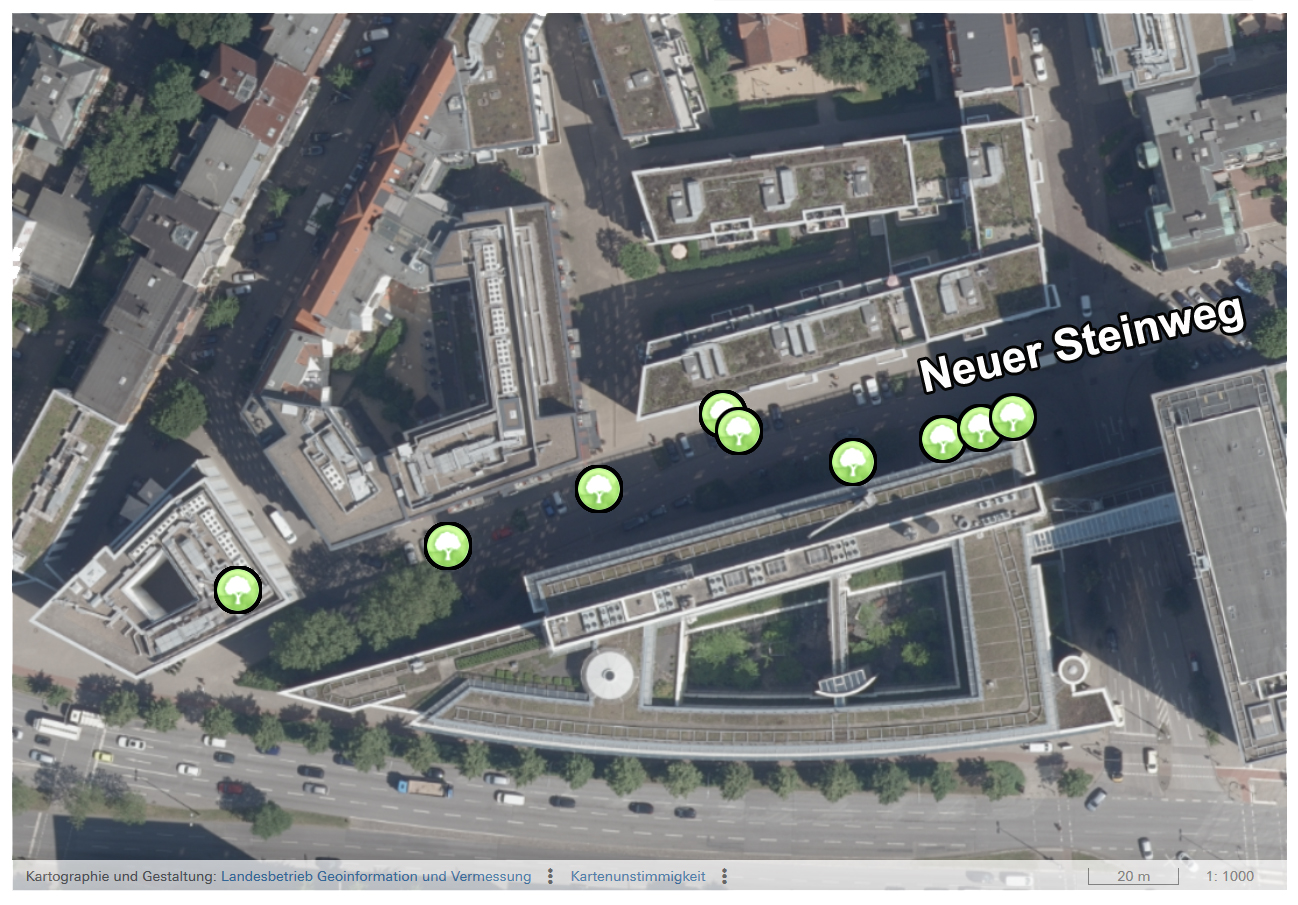About the Portal
Welcome to the Research Portal of Universität Hamburg
The scientific achievements of our scientists
The Research Portal presents information on research results and activities entered in the University's Research Information System (RIS) of the university (excluding medicine). The research data shown are available in the Research Data Repository (RDR) of the Universität Hamburg.
Despite our best efforts, no guarantee can be given for the correctness and completeness of the information.
Information on the Research Information System (RIS)
The research information system (CRIS) manages all the information based on the actual research activities of the academic research staff.
Once the data is entered into the RIS, it can be used multiple times, e.g. on websites, project proposals, or reports. This avoids double data storage and associated additional work. Furthermore, to the legal obligations for documentation of research activities, it increases the positive reputation of the university. As one result, information can be found more easily and thus the RIS can be used as a helpful tool, for e.g. scientist looking for partners, companies for the allocation of research projects, and the public can benefit from its transparency and information in general.
Research information is often requested by different interest groups. Exemplary, some of them are listed in the following table:
| Scientists | Presidium/ Deaneries |
Universities/ Research-Institutes |
Politics/ Authorities |
Companies | Media/ Public |
| Research-results, projects and activities | Generating reports | Finding of partners | Information on research activities |
Finding of research partners | Investigation, general interest |
The CRIS is aligned to the "Core-research dataset" (*CERIF data model), but also allows subject-specific classifications. The existing IT systems of the university are connected to the CRIS as data provider as well as publicly accessible, external data sources are integrated.
A differentiated role and rights model enables the distribution of tasks within the CRIS. According to their status, the users have different access to information in current and valid forms to add/create, manage and evaluate this data. The scientists themselves control the data and publication rights for different user groups in the system.
The software PURE of the Danish software manufacturer Atira (belonging to Elsevier) appeared to be the best solution for the Universität Hamburg. PURE uses a standardized, future-proof data structure according to European CERIF standard (*Common European Research Information Format) and benefits from ongoing development. Numerous interfaces enable the integration of existing systems and databases. PURE is an approved, university specific solution and to date has been implemented over 300 times worldwide.

Help and Service Agreement for the Research Information System
- Log into the Research Information System (RIS)
- Login with your user account (B-Kennung) and your password. User Account Information (only in German)
- Note: Administrative staff (TVP) are not automatically registered in the FIS. If you are interested in using it, feel free to contact us.
- Help and Documents
- Service Agreement (Dienstvereinbarung)
A service agreement has been concluded with the Staff Councils for Scientific Personnel and Technical and Administrative Staff. The document is only available in German.- Dienstvereinbarung (pdf)
(July 2018 with changes in Appendix 1 in July 2020)
- Dienstvereinbarung (pdf)
RIS training material
Various documents are available for the Research Information System (RIS). A manual written specifically for the University of Hamburg is available in German and English.
Training material
What data is displayed?
- Publications, lectures, research projects and many other activities of our scientists are summarized in the research information system of Universität Hamburg. Data from previous activities at other research institutions are also displayed, insofar as these are available. The research achievements are gradually being made accessible in the public Research Portal.
The research achievements of the Faculty of Medicine (University Hospital Hamburg-Eppendorf (UKE)) are presented in the research portal of the UKE . The University Heart Center Hamburg GmbH (UHZ) has its own research portal, which you can access at https://fis-uhz.de/portal . - Depending on the data category, there is a different time coverage of the data. Information on this can be found at the beginning of the relevant website. The main focus is on the collection of current data and data going back to around 2010. We also try to collect older data and make it accessible in a suitable form.
How do I research in the Research Portal?
- Possibilities of information research
All available data fields are searched for. However, there is no full-text search in the publications. Please also note that the exact search term entered is searched for. There is no translation or search for similar terms. Since English is the language of science, you should carry out your search with German and English terms. Are you looking for something about climate? Use "Klima" and "climate" as search terms.
- General search function: You can enter a search query (one or more terms) in the search field on the start page and you will receive hits from all categories, which are arranged accordingly on the hit page.
- Search in categories: You can use the buttons on the home page or the website menu to jump directly to the data categories (e.g. publications) and browse there or use the search function. You can limit the search using the filter options.
- Search with *
Add a * to the end of your search term and parts and word components will also be found. This is how you find the term climate e.g. also with air clima*. - Search with Boolean operators NOT, AND, OR
You can combine several search terms and refine your search query using Boolean operators. Please note that the operators must be written in capital letters:- Term-1 AND Term-2 - both search terms must be contained in the searched text. The search climate AND water finds all entries in which climate and water occur.
- Term-1 NOT Term-2 - the first search term must be contained in the searched text, the second search term must not be contained. The search climate NOT water finds all entries that contain climate but not water.
- Term-1 OR Term-2 - it is sufficient if the searched text contains one of the two search terms. The search for climate OR water finds all entries that contain climate or water or both search terms.
- Questions about the results?
- Do you have hits where the search term you used is not directly visible? Not all available information is displayed. So e.g. For example, when searching for a name, a dissertation is also displayed where the name is entered under the reviewers.
- Why does the search not work like the usual Internet search engines? Internet search engines collect data with every search: Which hits were clicked on? What matches the search queries? What similar terms are there? Statistics are used to establish probabilities as to what the searchers might have meant. This sometimes results in very good hit lists. This requires a great deal of effort, which we cannot afford in this form.
Why is (my) data not displayed?
- This can have various causes, e.g. missing data or data without approval for display in the Research Portal.
- As a scientist at Universität Hamburg, you can enter and edit your data in your FIS-account.
- Research results from medicine are presented in the research portal of the UKE.
Why are there errors in the data?
- The data comes from a wide variety of sources, such as publicly accessible databases, manual entries or UHH internal databases. Errors in the data are therefore usually based on the source systems or different representations and information, such as e.g. the year of publication.
- The correct and unambiguous attribution of the authors is particularly problematic with automatic publication imports. The only remedy here is to use unique identifiers (ID), which you can enter in your FIS account. In particular, the use of an ORCiD offers many advantages here.
Who do I contact if I have questions?
- The research information system, the research data repository and the research information portal are managed by the Center for Sustainable Reserach Data Management.
If you have any questions, please contact us! - Research information system: fis"AT"uni-hamburg.de
- Research data: forschungsdaten"AT"uni-hamburg.de
Technical information
- The Research Portal was jointly developed by:
- Conception and implementation of content
Zentrum für nachhaltiges Forschungsdatenmanagement der UHH - Visual Design
Abteilung Kommunikation und Marketing der UHH - Operation of the research information system, interfaces, data provision and web CMS
Regionales Rechenzentrum der UHH - Technical implementation and script development
Scientec Internet Applications + Media GmbH, Hamburg
- Conception and implementation of content
- With the exception of specially marked data, the displayed data is currently queried from the source systems.
- The Research Portal is optimized for display on all internet-enabled devices such as desktops, laptops, tablets and smartphones. Loading delays may occur depending on the performance of the Internet connection (bandwidth).
- As far as possible, the Research Portal is designed to be barrier-free. Nevertheless, not all offers and documents (e.g. publications on publishers' servers) that can be called up via further links may be barrier-free. In the case of publications in particular, the link often leads to paid offers from the publisher. Both are outside of our area of responsibility.
Sustainability and the Research Portal
The operation of the Research Portal and the database of the research information system requires servers, storage capacities, network components and cooling and thus consumes electricity and resources.
As part of the Hamburg Open Science (2018-2020) program, which was funded by the Ministry of Science, Research, Equality and Districts of the Free and Hanseatic City of Hamburg, 20 trees were planted in Hamburg, which will contribute to climate protection in the long term and help those that have been used up balance resources.
The trees were planted via the municipal program Mein Baum - Meine Stadt in cooperation with the authorities for the environment, climate, energy and agriculture and the Loki Schmidt Foundation. Common oak, sessile oak, downy oak, sweet chestnut, Japanese mountain ash and whitebeam were planted.
Trees produce oxygen and store CO2 (approx. 1 ton of absorbed CO2 per 10 trees on average worldwide, based on the following calculation: 10 kg CO2/year and tree and 10 years standing) and are also habitats for insects, birds and squirrels and improve the urban climate.
The first 11 trees have been planted according to the following picture on the main building of the UHH and on the Moorweide.

Trees 12 to 20 have been planted in the Neustadt area on the Neuer Steinweg street.

